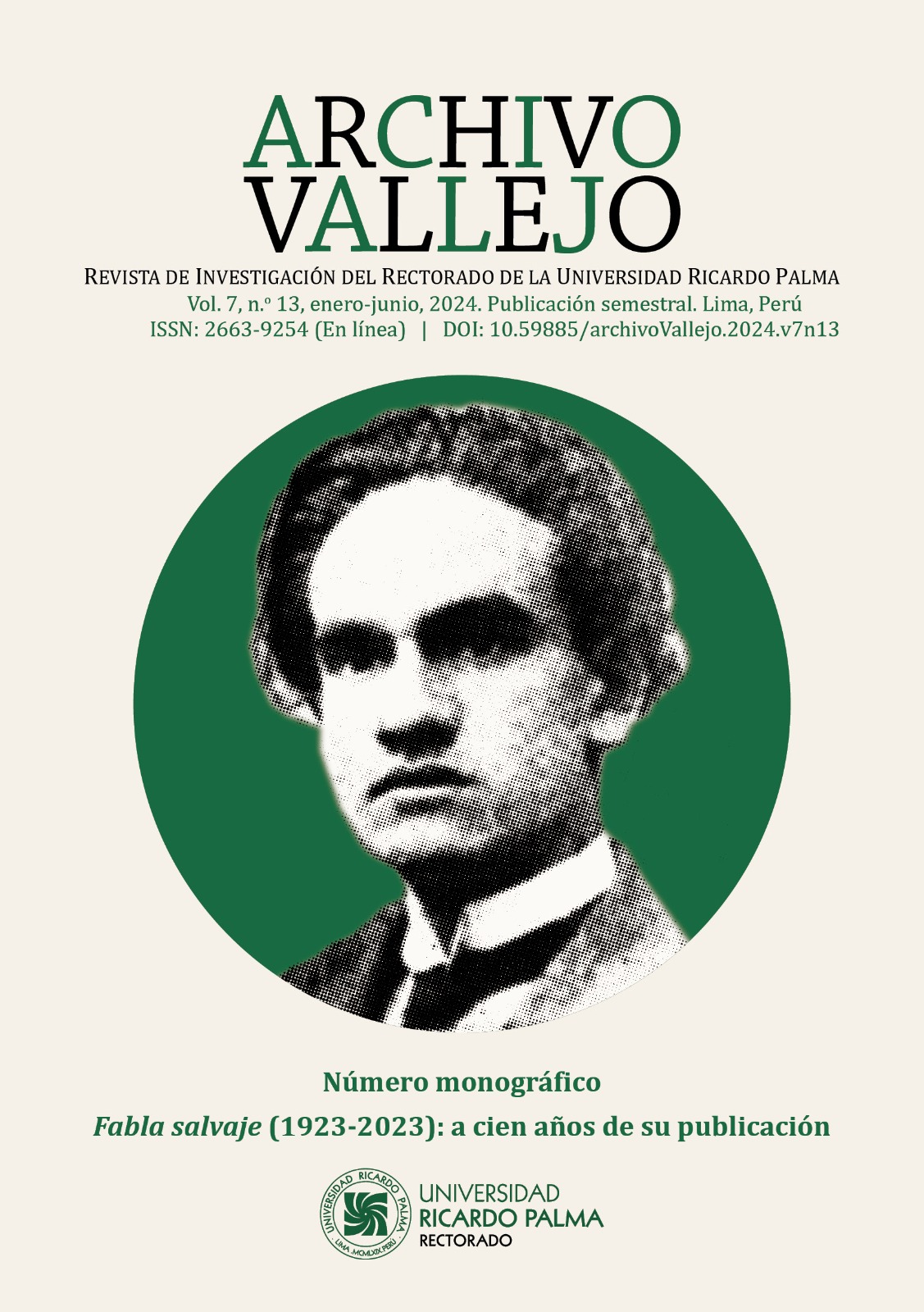«Aquel día en que cantó la gallina»: an ecocritical reading of Fabla salvaje
DOI:
https://doi.org/10.59885/archivoVallejo.2024.v7n13.02Keywords:
ecocriticism, Andean transculturation, Amerindian epistemology, Amerindian ontology, narrative heterogeneityAbstract
This article proposes a reading of the short novel Fabla salvaje (1923) from the point of view of ecocriticism. Although this work has an inescapable psychological plot, the different psychological passages through which the main character (Balta Espinar) goes through have a correlation with natural phenomena which, in turn, seem to correspond to certain Amerindian cosmogonies. Vallejo’s narrative evidences an indigenous poetics that understands other beings as bearers of agency and spirit; however, the characters’ relationship with the territory, which at first appears harmonious, soon reveals itself to be hostile and disturbing. Fabla salvaje can be read, precisely, as the dramatic testimony of a transculturated subject incapable of resuming a healthy link with the native geography; in this sense, it can be proposed that Balta Espinar is an alterego of Vallejo and his conflictive relationship with the native village, the feminine, paternity and nature.
References
Escobar, A. (1973). Cómo leer a Vallejo. P. L. Villanueva Editor.
Estermann, J. (1998). Filosofía andina. Estudio intercultural de la sabiduría autóctona andina. Abya Yala.
Favaron, P. (2017). Las visiones y los mundos: sendas visionarias de la Amazonía occidental. Centro Amazónico de Antropología y Aplicación Práctica; Universidad Nacional de Ucayali.
Flores, W. (2017). Deconstrucciones teoréticas, desmitificación y voces indígenas: hacia una ecocrítica latinoamericana. Revista Internacional d’Humanitats, (39), 43-48. http://www.hottopos.com/rih39/43-48Flores.pdf
Heffes, G. (2014). Para una ecocrítica latinoamericana: entre la postulación de un ecocentrismo crítico y la crítica a un antropocentrismo hegemónico. Revista de Crítica Literaria Latinoamericana, 40(79), 11-34.
Hopkins, E. (2020). Fabla modernista en Fabla salvaje de César Vallejo. Lejana. Revista Crítica de Narrativa Breve, (13), 140-148. https://doi.org/10.24029/lejana.2020.13.438
Mazzotti, J. A. (2021). Introducción: Fabla salvaje o el «otro yo» de la peruanidad. En C. Vallejo, Fabla salvaje (pp. 5-33). Fondo Editorial de la Universidad César Vallejo.
Olascoaga, J. F. (2009). El mundo andino en la obra de César Vallejo [tesis de doctorado; Texas Tech University]. http://hdl.handle.net/2346/13113
Valenzuela, J. (2022). Subjetividad y animalidad en Fabla salvaje de César Vallejo. Anales de Literatura Hispanoamericana, 51, 149-157. https://dx.doi.org/10.5209/alhi.85131
Vallejo, C. (1954 [1915]). El Romanticismo en la poesía castellana. Juan Mejía Baca & P. L. Villanueva, Editores.
Vallejo, C. (2021 [1923]). Fabla salvaje. Fondo Editorial de la Universidad César Vallejo.
Villafán, M. (2014). Fabla salvaje, de César Vallejo: más acá del complejo de Edipo. En G. Flores (ed.), Vallejo 2014. Actas del Congreso Internacional Vallejo Siempre. Tomo 1 (pp. 375-400). Editorial Cátedra Vallejo.
Downloads
Published
How to Cite
Issue
Section
License
Copyright (c) 2024 Pedro Favaron Peyón

This work is licensed under a Creative Commons Attribution 4.0 International License.
Los contenidos publicados en la revista están bajo una licencia CC-BY 4.0, la cual permite:
- Compartir, copiar y redistribuir el material en cualquier medio o formato.
- Adaptar, remezclar, transformar y construir a partir del material para cualquier propósito, incluso comercialmente.
Bajo los siguientes términos:
- Atribución. Usted debe dar crédito de manera adecuada, brindar un enlace a la licencia, e indicar si se han realizado cambios. Puede hacerlo en cualquier forma razonable, pero no de forma tal que sugiera que usted o su uso tienen el apoyo de la licenciante.















